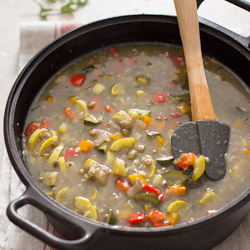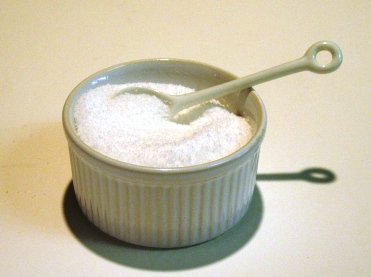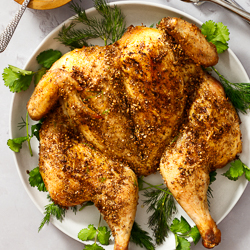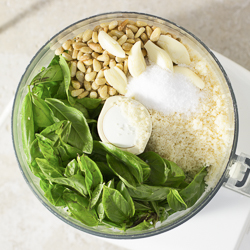This afternoon, as I was sitting down to taste the fruits of the day’s labor with my incredible intern, Judy (yes! in addition to people who are willing to test my recipes at their own expense just because they think it’s fun, there is actually someone who’s generous enough to COME TO MY HOUSE one or two days a week and cook with me just because she thinks it’s fun and a great learning experience! sometimes there are even TWO people willing to do that! which is such an over-the-top incredibly ridiculous contribution that it’s worthy of its own post, which I will some day get to)—anyway, Judy and I were sitting down to taste the fruits of the day’s labor, when my brother, who was visiting Napa, showed up. (That’s him and me in the photo.) So we invited him to taste with us and, since it was now a party of three and we didn’t want to leave him out, we invited my husband to come out of his office and join us as well. At one point during this tasting party, my brother said he thought a dish needed salt and—well, I had to tell Judy the story of how I learned about salt. And so now I’ll tell you.
It was 16 or 18 years ago, and I wasn’t yet a professional cook, but I was an avid home cook. I was also a pretty avid always-on-a-diet-er and so, obviously, I rarely used salt because God forbid I should retain an ounce of water and weigh that extra ounce. I was living in L.A and one afternoon I cooked up a big pot of vegetable soup, which tasted exactly like dish water. I remember talking to my brother, also in L.A., on the phone, complaining about my terrible soup. Later that day, he stopped by for a visit and, despite my dish water description, was brave enough to try some soup. He stood over the stovetop, swallowed a spoonful, and said, “Um, this just needs salt.” He added some salt, we tasted it again, and damn if that soup didn’t go from dish water to delicious. It was like magic. And the only difference was the salt.
Since then, thankfully, I’ve abandoned my quest to weigh as little as possible and found my peace with the extra ounces (and pounds)—and become a liberal salt sprinkler. I’ve also become a professional cook and learned from many other professional cooks, adding to my seasoning expertise. One memorable lesson: my husband and I were sitting at the counter at Rosa Pistola in San Francisco, enjoying an appetizer or two and watching the cooks work the grill. We noticed that before each dish went out, it got a liberal drizzle of olive oil and a generous sprinkle of salt. The lesson? Salt and fat make pretty much everything taste better.
I tell this story in my classes all the time—about my fabulous brother and my awful soup going from dish water to delicious—because I think that home cooks are often shy about salt.
I understand the hesitation. You’ve made a great dish, you’ve spent your precious time, effort, and money on it, and so, understandably, you don’t want to ruin it by over seasoning it. Here’s my recommendation.
Season the dish as you see fit. But then, take a spoonful, sprinkle it with a few grains of salt, and taste. Was that bite better or worse? If it was worse, the dish is done. But if it was better, add salt to the whole dish and repeat the experiment. Keep tasting, a bite at a time, adding a few grains of salt at a time, until those few grains make the bite taste worse instead of better. Over time, you’ll learn about the difference that salt makes and you’ll feel more confident seasoning the whole batch. Ultimately, you’ll be a more confident cook and you’ll more thoroughly enjoy the foods you make because, well, they’ll taste better.
(Should you decide to try this experiment, let me know how it works out for you.)
My brother is currently driving his way back to L.A. But I send him a salty thank-you for the visit, and for teaching me one of my first and most important cooking lessons. I appreciate it, and him, every day.









